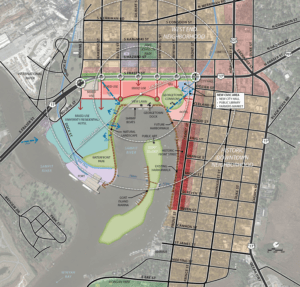Top Story
Advisory Services Recap is a new feature that spotlights a recent Advisory Services panel engagement, providing a quick overview of the land use challenge panelists addressed and the recommendations they offered to the panel sponsors. This month, we feature a panel in Georgetown, South Carolina that was held in September. A full summary is also available to learn more about the panel’s assignment.
The Land Use Challenge: The city and county of Georgetown, South Carolina, sought ULI’s advice on redeveloping 150 acres (61 ha) of industrial waterfront land that includes the recently shuttered ArcelorMittal steel mill and the Port of Georgetown. The second-largest seaport in the state, Georgetown is a city of 9,000 residents, located an hour south of Myrtle Beach and 90 minutes north of Charleston.
The Context: In 2015, ArcelorMittal, the world’s largest steel producer, closed the steel mill, which had been a major employer in Georgetown since the 1960s. The Port of Georgetown also faces uncertainty due to competition, evolving cargo shipping patterns, and costly new federal dredging requirements.
The Assignment: The panel was asked to assess the market conditions and redevelopment potential for the site with a focus on creating greater economic opportunities for Georgetown residents and transforming the area into a vibrant, multifaceted place for new residents, businesses, and visitors.
The Recommendations: While the panel concluded that current market conditions are less than optimal for the site, the time to create a long-term vision and plan for attracting private investment to the site is now. The panel urged stakeholders to consider the site an incubator for entrepreneurs, businesses, and sectors that will help diversify the economy and forge a new economic destiny for Georgetown. The panel also recommended leveraging the site’s assets—its waterfront location and legacy industrial infrastructure—to attract investment.
Panel Chairman Alex J. Rose’s takeaway: “Georgetown is a city of incredibly unique and authentic assets, notably the surrounding natural resources, its industrial history, and its cultural heritage. Currently, the area lacks adequate market drivers to accommodate redevelopment of the entire site, yet its size and location on the waterfront near the west end and historic downtown neighborhoods provide a once-in-a-lifetime opportunity to transform Georgetown physically, economically, and socially.”
To learn more, read the full summary of the panel’s recommendations.

